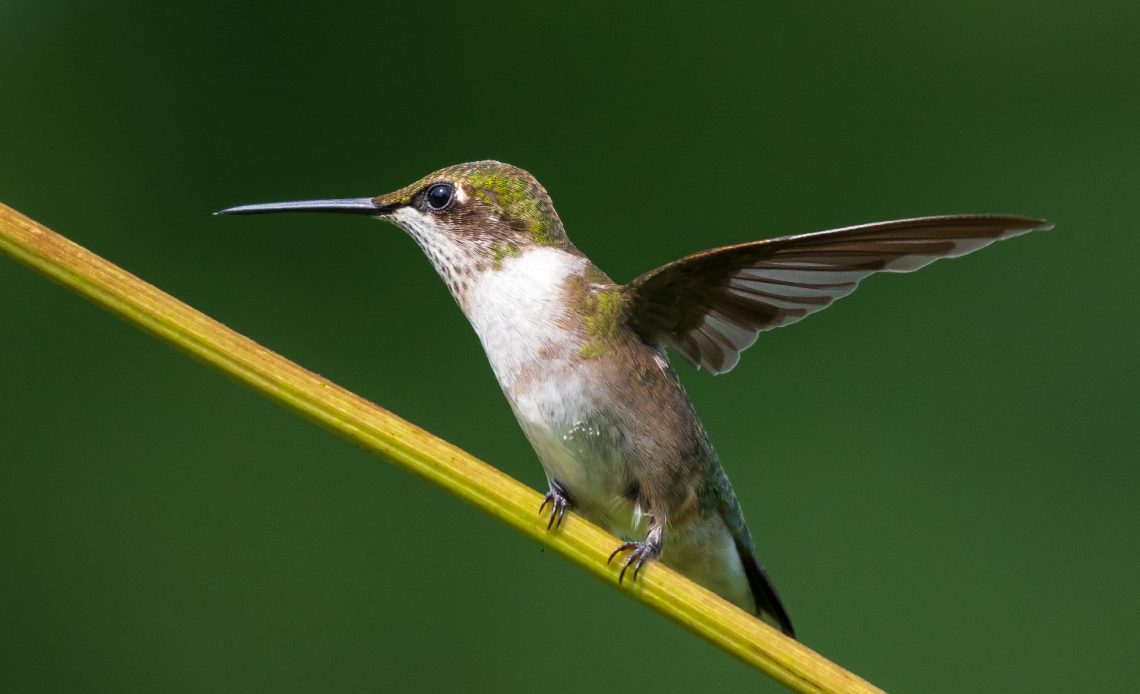

We’re here to help! Wild Yards is a completely free website that is 100% dedicated to helping you create a wildlife-friendly, sustainable yard. Read more
WildYards is reader-supported. When you buy a product through a link on our site, we may earn a comission. Every product is independently selected by our (obsessive) editors and our reviews are unbiased and objective. Read more about our mission or our privacy policy.
Hummingbirds are known for mainly eating from plants, flowers, and feeders we set up for them. However, they are also prone to eating the occasional bug or insect when fluttering their way. But, do hummingbirds eat mosquitoes?
Hummingbirds happily eat mosquitoes. Many gardeners refer to hummers as their own natural pest control – as they will snap them out of the air if they fly too close. Hummingbirds rely on winged pests and other minibeasts for, among other reasons, their protein content.
Why do hummingbirds kill mosquitoes?
Hummingbirds eat mosquitoes largely as a result of their opportunistic feeding habits. Mosquitoes are famously quick to reproduce, with their pupae growing into fully-formed adults in just two days. Additionally, mosquitoes are attracted by carbon dioxide and body heat – they are famously ubiquitous across the US.
Thankfully, while hummers won’t typically hunt down mosquitoes, they can take care of the tiny bloodsuckers for us if the opportunity arises. Mosquitoes may, for example, fly around sweet-smelling plants and fruit that hummingbirds are attracted to. If they get in the way of our feathered friends’ long beaks – they are in danger of becoming part of the feast.
Anecdotal evidence suggests that hummingbirds will also ‘fish’ mosquitoes out of spider webs and nests if close to their feeding zones. Interestingly, hummingbirds will eat spiders, too – if they get in their way!
Do hummingbirds eat other insects?
Hummingbirds eat aphids, flies, gnats, ants, and a variety of bugs. They don’t show a preference for mosquitoes – they just happen to propagate wildly, and hummingbirds need an incredible amount of calories just to keep hovering from day to day. Of course, the hummer will need more than bug meat alone to keep up to its mind-boggling caloric demands.
Hummingbirds are omnivorous, which means they show no dietary preference. While they may be best known for consuming nectar from flowers and the sap from trees, they will eat insects and bugs for the added protein. That’s essential for muscle growth and maintenance, and hummers are surprisingly stacked!
Mosquitoes help provide protein in the diet of ruby-throated hummingbirds, for example, which have a general flight muscle mass that accounts for up to a third of their entire bulk. Given that all species of hummingbirds spend most of their days hovering, this muscle conditioning is perhaps unsurprising.
Some wild yard owners choose to feed dried insects to hummingbirds in their feeders, too. Given that mosquitoes are rife across the US during the warmer months of the year, it’s recommended you leave your visiting hummers to feed themselves – and take care of blood-sucking pests at the same time.
Are mosquitoes a hummingbirds’ favorite food?
Not necessarily – mosquitoes don’t tend to compete with hummingbirds for the same food, and at the same time, it’s rare you’ll find winged pollinators hunting these bugs down. A rare occasion where you’ll see a hummingbird open its beak is when mosquitoes are around – they snap open and back again to swallow them down.
Hummingbirds don’t have one or two ‘favorite’ foods, though you will mostly see them feeding on colorful plants and flowers across your garden (if you’re lucky enough to attract them!). Mosquitoes happen to be a by-product of a wild yard that hummers will gladly take care of for you.
The hummingbird’s metabolism requires it to gorge on hundreds (perhaps even thousands) of flowers per day, where it will find abundant, sugary nectar to eat in a quick fix. They’ll happily flutter around flowers such as zinnias, sunflowers, and honeysuckle, which are famous for serving up lots of natural sucrose.
Building a wild garden replete with different flowers – likely to attract minibeasts such as flies and mosquitoes – is the best strategy for attracting hummingbirds. Given that hummingbirds can consume up to three times their own body weight in food per day, providing enough nutrition sources for local pollinators will keep them coming back to you.
Grow snapdragons, morning glories, fuchsias, and trumpet-shaped flowers – the hummingbird will prefer dipping its beak into these blooms over all others.
Should I rely on hummingbirds to kill mosquitoes?
If you can regularly attract hummingbirds to your garden and struggle with a growing mosquito population, it’s safer to feed the birds than to use pesticides. Many chemicals and mosquito repellent solutions can also harm other animals in your garden.
It’s even reported that relying on insecticides can encourage local pests to ‘resist’ frequent sprayings. Many people welcome hummingbirds as a priority – the ecosystem takes care of itself.
Don’t be surprised if you see a hummingbird snap up a mosquito or two – but keep aware, that it’s still a good idea to balance out the bug side of their diet with a garden rich in colorful blooms.
